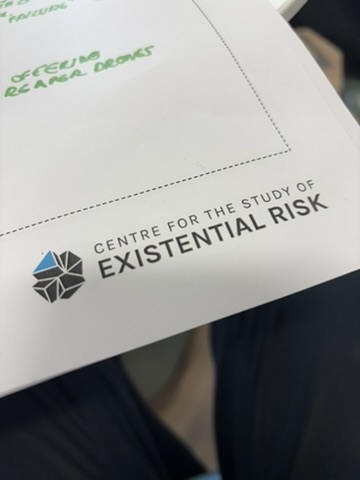The problem I have, you see, is that I have chosen to spend so much of my time thinking about this damned AI thing. Now, back in 2017 or whenever it was where I was like ‘what’s going on with the stories around this thing’ I thought it was a kooky little wheeze that would be an enjoyable diversion of a PhD and now it’s in my goddamn face all the time. Reading about the policy design of sentience and debates over whether something feels pain or not and whether it should when we already have a room full of real actual pain. No shade on the authors of that paper by the way, it’s just the frustration of ‘is this the right thing to be knowing a lot about?’
Sorry for the missing of last week. I decided to build some shelves and that took up all my free time. Ok so quick thing is that I’ve thrown down the gauntlet on a PhD deadline. As a designer I work best with a looming deadline but that might mean that I need to skip a missive here or there in the next few weeks but I’ll try not to.
Five Things
Hey, here are five things I thought about this week so you didn’t have to.
1. Kessler Syndrome
Last week I was in Cambridge for a day-long dramurturgical workshop with the Centre for the Study of Existential Risk. As attendees we took on different roles related to an impending crisis facing the UK after a natural disaster. I gleefully (perhaps too gleefully) took on a role as a Musk-y DOGE-bro refusing access to technology and holding the UK hostage on a political whim.

It was great to meet some interesting folks and have some amusing roleplay going on but I also learned about (from some of the space experts in the room (which might by now give you a clue as to what the crux of the scenario was)) Kessler Syndrome.
The short version is; because there are so many things orbiting the Earth, all tightly packed together and moving really fast, that the collision, destruction or disintegration of one satellite ends up kicking off a chain reaction with debris flying around and accelerating and hitting more satellites that then disintegrate and so on and so on. Not only does this mean that the systems we depend on satellites for (loads) all go out of action but that there’s so much debris there in space that we effectively end up grounded for generations, unable to put anything in space because it will likely get hit.
A 1 kg object impacting at 10 km/s, for example, is probably capable of catastrophically breaking up a 1,000 kg spacecraft if it strikes a high-density element in the spacecraft. In such a breakup, numerous fragments larger than 1 kg would be created.
I don’t know how I’d never heard of this because the ramifications are insane! It’s basically a space-war deterrent because there’s a good chance that taking out a satellite with a missile, destroys access to space for hundreds of years.
In 2024, the Chinese Long March 6A exploded on launch throwing 700-900 large pieces of debris into low-Earth orbit which has been like the Cuban MIssile Crisis of Kessler Syndrome (again, how have I not heard about this?!) On average, one satellite is destroyed every year by collision and I can only imagine this keeps the remaining NOAA and NASA scientists on edge. It’s possible, according to some scientists, that Kessler Syndrome has already begun.
There’s obviously a lot going on in policy to try and avoid this happening but it’s also kicked off investment in robotic capture, harpooning(!), and big electromagnets to pull things down.
What confuses me a little is why it’s called a ‘syndrome‘ – “symptoms or conditions that occur together and suggest the presence of a certain disease or an increased chance of developing the disease.” In that interpretation is the disease the amount of stuff we put in space.
Also syndrome means ‘sun run.’
So what? It’s a useful reminder that we’re in the midst of several overlapping existential crises, not on tenterhooks for the next one and that it can be hard to get perspective on this while you’re (potentially) in it. Also that it’s worth thinking and talking about alternative to space based systems.
2. Design in 2040
I posted about this on the Blue Jobs Website) but Lucy Kimbell and team have put up the videos and background from the Design in 2040 project which, amidst the chitter and chatter about whether design is dead, is a useful reminder that design is more than digital products.
In most of the open playing field of the Internet, ‘design’ is conceptualised as basically some form of making apps. People will fight between products and UX (I honestly couldn’t tell you the difference) but there’s a curiously narrow understanding of the history and breadth of practice. I’ve never been as flabbergasted as when a relatively senior academic at another institution suggested that “design should be reincorporated back into computer science where it came from.”
So what? It’s fun to speculate on futures for design. There are five in this project and I’ve mulled (and continue to mull) this question of what happens when everyone is a designer? More than that though, I think there’s profound utility in policy making, education and business in showing not just what design can do now but what it could do if inculcated right.
3. We know too much about American politics
A few years ago someone asked why we (read: I) can name dozens of American politicians but maybe one or two French ones ? For a while the news was more diverse but my podcast feed is now just myopically focussed on whatever the orange man in the big white house wants people to be getting excited about. So, an ask; I’m searching for alternatives: I want to know more about Indonesian politics, about Bolivian industrial policy, yes, even France. What good podcast gives a genuine deep dive on global affairs. E.g. what Chinese Doom Scroll does for China. There’s also Rest of World but while the newsletter is pretty regular, they only pod every few months and I need to know everything every day!
So what? This does sound like something that a big serious organisation could or should be doing. It’s a damning indictment of the algorithm. It’s also a way of drawing focus from the big orange man.
4. Careless California Corporate vs Revel Idiosyncraticism
I would really like Ai to work for me. I have the full CoPilot at work but the problem with eschewing California Corporate speak in lieu of my particular idiosyncratic vocabulary and communication style is that anything I try to write with CoPilot so obviously sounds written by a machine, more accurately; a cheery business-friendly Californian machine: I would never use exclamation marks, I would definitely call someone ‘an absolute treasure to humanity and the arts’ in an introductory email and I would never sign off ‘best regards.’ So I draft up these emails with Gary the Intern (our nickname for CoPilot) and just think ‘well, now they’re just going to think I’m lazy and don’t care about them so I’m going to have to rewrite all this.’
I came across two parallel ideas on two podcasts this week. One about learning skills and the other about task management. So the first – there are open and closed loop skill learning cycles. So, for example, if you’re playing tennis, you are informed after every stroke/whack/hit/Idon’tknowwhatyoucallit whether the action you took was successful and consequently what you could do differently next time. This is closed loop learning. Open loop is like cycling, there’s no direct feedback and learning might happen over longer periods. Then you have weight-lifting versus forklifting. You weight-lift to train and gain muscle, you forklift to move tings.
Something about hearing these two things in quick succession gelled with me and I though ‘hey I could write this down as a piece of unsolicited thought leadership about how to work with AI.’ I’m not sure it’s advice, but there’s something here about how I think about the different things I do in my life and spend time doing.
| Forklifting | Weightlifting | |
|---|---|---|
| Open Loop (cycling) | Working on major projects? Insipient thrust of change? | Reading? |
| Closed Loop (tennis) | Communications – responding to emails and messages at scale | Blogging – writing regularly, better or worse to practice thinking and learning Rendering – for similar reasons |
So what? More thinking to do here. I don’t have the time to ‘experiment’ or try out new things and I sort of resent the think leaders who tell me to experiment and build my own workflow. Surely the point of al of this was to alleviate the effort I have to put in, not add to it. (Says the guy who spent a week building an Obsidian vault.) There’s still no convincing ‘this makes this better’ argument that’s been made by any of these generative AI organisations. Yes, the odd task here or there but then that’s a lot of lifting for meagre improvements. If you’re the type of person who before all this was eagerly preaching about the fediverse, setting up crypto wallets and likely, installing Linux, this is all fine. But if you’re the type of person who open a laptop, gets 118 Teams messages, 35 Slack messages, 8 reminders pop-up and a three-year old ask for a banana, I need it clearer.
5. Centaur Service
I mean, on that note, Venkatash Rao here, formerly of RIbbonfarm, now of Contraptionist. I want to quote this where he’s writing about how he now writes with AI and expects us to read with AI.
For those of you struggling to keep up, a sincere suggestion — start using AIs to help you read. And no, AI-assisted production and AI-assisted consumption do not cancel out.
My AI expanding my one-liner prompt into a 1000-word essay that is summarized to a one-liner tldr by your AI is a value-adding process because your consumption context is different from my production content.
High compression/expansion ratios in such writer-reader relationships do not mean there is low information content. A 1:100:1 expansion/compression pipeline does not mean there are only ten words worth of information in a 1000-word transmission. The other 990 words go towards mind-melding our contexts.
Something clocked in that ‘mind-melding’ of contexts. Maybe it is the case that 90% of data we send to each other in words is just setting context by which we should read; tone, position, understanding, emotional sense, priors etc. And maybe it’s then ok that the machines just tell each other this bit and we do the rest.
I suppose what’s missing here and that I still cling on to is all the empirical evidence that shows the act of writing enhances cognitive capabilities. If you’re outsourcing your cognitive capabilities to a machine then does that mean they’re less transferable? I don’t know and really Rao should have written number 4, this is much more his wheelhouse.
So what? There really is something here. I’m not precious or nostalgic about any media. I like what Rao is saying. It’s actually a genuine concern that some of those critical faculties are fore-shortened by diverting cognitive load to a machine. I keep coming back to something I head in another context ‘proliferation not scale.’ The nature of expertise is changing.
Shorts
- Fascinating long-form about human-chatbot relationships particularly swirling around Replika. I’m (trying) to write about this stuff in the PhD at the moment.
- Carly Ayres on what happens when ‘image production is ambient, like wifi‘ As a follow on to last week; when the cost of doing anything is nothing, you copy everything.
- Brian Merchant republishing Tim Maugham’s Flyover Country which appears to be what the Republicans currently envisage for their country.
- Colossal biotech have de-extinctified (pardon the technical terminology) dire wolves. Now I always thought dire wolves were a video game thing but apparently they’re a real thing so not only are they an extinct animal that’s been genetically reproduced but also an imaginary fantasy animal that’s been made flesh.
Upcoming
- My first stint as Visiting Professor at the Eindhoven AI Systems Institute starts next week. I’ll be around Monday to Friday with a pretty packed schedule but let me know if you want to chat and I’ll see what we can do.
- In mid-May I’m off to Germany to talk at re shape forum. It’s no lie to say I’m genuinely intimidated to share the stage with three or four people whom I think are just the most interesting creative critical thinkers in this space and I’m super excited about them all being in the same room together.
Listening

I’m a bit up and down on Poppy, some of that album is great some is meh. But Babymetal are a solid 100 every time.
I don’t know what to do with Five Stories from the Distant Future. People say ‘you should do something with that’ – well I did. I put it online for everyone to read but I don’t know what else to do. Let me know if you ahve any ideas. Ok love you, speak next week.
